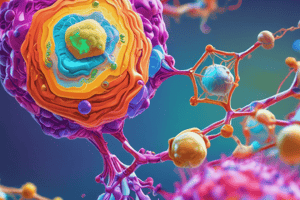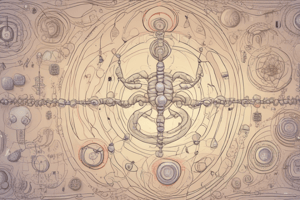Podcast
Questions and Answers
Which type of hormones are derived from amino acid tyrosine?
Which type of hormones are derived from amino acid tyrosine?
- Epinephrine and norepinephrine (correct)
- Peptide/Protein hormones
- Steroid hormones
- Parathormone and calcitonin
Which factor regulates the action of a hormone at a target organ?
Which factor regulates the action of a hormone at a target organ?
- Hormone-specific receptors in target cell membranes (correct)
- Specific transport systems in plasma
- Metabolism
- Rate of synthesis and secretion
What is the main property of steroid hormones?
What is the main property of steroid hormones?
- They are stored in the endocrine gland
- They are steroid in nature (correct)
- They act through calcium
- They are large proteins or small peptides
What is the definition of hormones?
What is the definition of hormones?
What is the mechanism of action of peptide hormones?
What is the mechanism of action of peptide hormones?
Describe the classification of hormones based on their nature and provide examples for each category.
Describe the classification of hormones based on their nature and provide examples for each category.
Explain the factors that regulate the action of a hormone at a target organ.
Explain the factors that regulate the action of a hormone at a target organ.
What are the various ways in which a hormone can act, and briefly describe the mechanism of action of peptide hormones?
What are the various ways in which a hormone can act, and briefly describe the mechanism of action of peptide hormones?
Elaborate on the mechanism of action of insulin hormone.
Elaborate on the mechanism of action of insulin hormone.
List the hormones that act through cAMP-cGMP and those that act through calcium, and provide examples for each category.
List the hormones that act through cAMP-cGMP and those that act through calcium, and provide examples for each category.
Flashcards are hidden until you start studying



